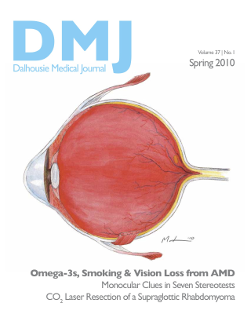Omega-3 Fatty Acids, Smoking and Vision Loss from Age- Related Macular Degeneration
DOI:
https://doi.org/10.15273/dmj.Vol37No1.3863Abstract
Age-related macular degeneration (AMD) is the leading cause of vision loss in the developed world. Despiteits prevalence no cure exists for atrophic dry AMD, which is the most common form of this disease. Severallifestyle modifications including the absence or cessation of smoking have been identified as preventive to AMDdevelopment. More recently, research has indicated that a diet high in omega-3 fatty acids may be beneficial in theprevention of AMD. This review critically analyzes the literature concerning the effects of both smoking abstinenceand omega-3 fatty acid intake on the prevention of AMD. Taken together, this research indicates that increasedconsumption of omega-3 fatty acids (e.g. fish twice or more per week) halves the risk of both early and late AMDwhile smoking doubles the risk of AMD.Downloads
Published
2010-04-12
How to Cite
Murphy, J. A. (2010). Omega-3 Fatty Acids, Smoking and Vision Loss from Age- Related Macular Degeneration. DALHOUSIE MEDICAL JOURNAL, 37(1). https://doi.org/10.15273/dmj.Vol37No1.3863
Issue
Section
Review
License
Authors who publish with this journal agree to the following terms:
- Authors retain copyright and grant the journal right of first publication with the work simultaneously licensed under a Creative Commons Attribution License that allows others to share the work with an acknowledgement of the work's authorship and initial publication in this journal.
- Authors are able to enter into separate, additional contractual arrangements for the non-exclusive distribution of the journal's published version of the work (e.g., post it to an institutional repository or publish it in a book), with an acknowledgement of its initial publication in this journal.
- Authors are permitted and encouraged to post their work online (e.g., in institutional repositories or on their website) prior to and during the submission process, as it can lead to productive exchanges, as well as earlier and greater citation of published work (See The Effect of Open Access).


